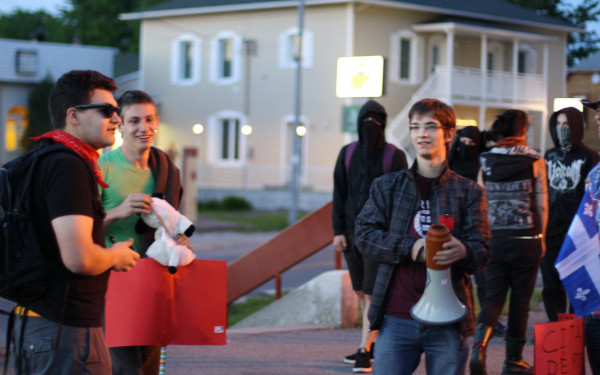The Magic Word Is “Terrorism”
Glenn Greenwald Talks Surveillance, Ottawa and Fear-Mongering
Friday evening at Concordia, Glenn Greenwald almost immediately addressed the controversy that led him to achieve what those who believe in the “polite Canadian” stereotype never thought possible.
“I wanted to spend the week having my inbox filled with angry Canadians,” joked Greenwald, the journalist responsible for publishing whistleblower Edward Snowden’s NSA and global surveillance leaks in 2013. “I finally accomplished that, so I’m really thrilled.”
Despite writing a controversial article about Monday’s murder of Warrant Officer Patrice Vincent and Canadian involvement in the Middle East, Greenwald was introduced to a roaring crowd of nearly 700 in the Hall Building’s Alumni Auditorium.
Concordia welcomed the journalist and former constitutional lawyer for a talk on government surveillance and the resulting loss of civil liberties in Western democracies as part of the Concordia Student Union’s Speaker Series.
The playful tone quickly shifted as Greenwald addressed the week’s concurring attacks on Canadian soldiers stationed at home.
“Western governments have been able to shape and manipulate their citizenries in the name of terrorism, in order to dismantle the basic civil liberties and other legal protections that have long come to define how we think of ourselves in Western democracies,” said Greenwald. “I think you can even say this week has been a perfect laboratory for understanding how that takes place.”
The theme of the talk was similar to that of the article he published less than an hour before the Ottawa shooting on Wednesday on The Intercept—the independent news website Greenwald co-edits—in which he condemned what he considered Prime Minister Stephen Harper’s “fear-mongering agenda over terrorism” after Monday’s events in Saint-Jean-sur-Richelieu.
1_700_1050_90.jpg)
“The function of the word ‘terrorism’ is to render a rational debate impossible,” Greenwald told The Link. “Once that word gets injected into the discourse, you’re almost obligated to embrace a whole array of positions and opinions upon pain of being criticized and attacked […] and that’s the reason why governments love that term.”
Greenwald also noted how the word is used as a tool to generate fear among citizens and therefore facilitate a government’s surveillance of its population.
“It’s this sort of authoritarian dynamic where if you scare the population enough, they will almost demand that the government acquire more power,” he said.
The Harper government took advantage of the emotions the word “terrorist” incites in order to push for wider surveillance, he said.
Greenwald explained that a contributing factor to this is the media’s portrayal that we in the West are constantly the victims and “forget, by design” that we are also responsible for the deaths of hundreds of thousands of children, the support of tyrannical governments, and the destabilizing of many countries in the Middle East which causes anger and resentment in the region.
“When they bring [the aggression] back to our part of the world, the reaction is, ‘We need to drop more bombs,’ […] which in turn increases the anger and resentment and anti-Western sentiment of that part of the world, which brings more violence to our country, which ensures that the cycle continues,” Greenwald said.
“When future generations look back on what we’ve done, they will say that we were in a posture of endless war.”

3_900_600_90.jpg)
2_900_600_90.jpg)


2_600_375_90_s_c1.jpg)
_(1_of_1)_600_375_90_s_c1.jpg)
webedit__600_375_90_s_c1.jpg)
